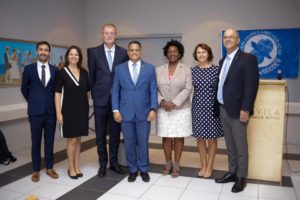CELEBRATION UNITED NATIONS DAY 2019
Address by His Excellency, Mr. Eugene Rhuggenaath, Prime Minister of Curaçao
With all protocol observed…
It is with somewhat of a mixed feeling that I address you today. On the one hand we are all saddened by the fact that Mr. Karel Frielink is stepping down as Dean of the Consular Corps of Curaçao after doing a splendid job these last three terms, in a way that only Karel can; he not only united the Consular Corps but actively encouraged the involvement of the Consular Corps with our population in general and our youth in particular.
This speech contest is a wonderful example of the latter and it fills me with joy to again hear how many speeches were entered. Unfortunately, I was not able to convince my daughter to participate. I guess she takes after her father, after all.
As we all know, this year has been declared by the United Nations as the international year of the indigenous language and so it is only logical that one of the topics of this year’s speech contest, touches upon this important observation. It is – of course – a subject matter close to our hearts as, not so long ago Papiamentu wasn’t even considered an official language.
The official classification as a language happened only 12 years ago in 2007, at which point not even the sceptics could continue classifying Papiamentu as a mere Creole dialect.
Fortunately, in time, we learned to value our own language. As we know our Papiamentu is even valued and taught in other countries. I also once discovered that our dushi language was even appreciated from a distance, when a fellow traveller responded with excitement, when he heard me speak Papiamentu on the phone. Turns out, he fell in love with our language when he was living in Coro, Venezuela, while listening to Curacao radio broadcast. It was the first time he heard it spoken ‘live’.
Throughout her more or less 300 year history, our native tongue has proven to be resilient in holding strong, steadfast and avoiding the extinction which many creole languages born in the last centuries have fallen prey to; which touches upon a subject I have been interested in for quite a while, namely, cultural resilience.
Many people nowadays associate resilience with climate change, but it is much broader than this. One of my aims as Prime Minister is to build more resilient communities. And an emphasis on culture and heritage can act as a catalyst for this.
Many linguists agree that Papiamentu’s endurance and resilience is a unique one and one that stands out amidst the worldwide trend of Creole languages that are being swallowed up by dominant languages like English, French and Spanish.
The fact that our native tongue was used in trade without distinction based on race, creed or national origin is also deemed an important contributing factor to its endurance and resilience. When I was a child, I wrote an essay proclaiming Papiamentu as the next world language; who knows, …
Regarding the second topic, I am extremely eager to hear the thoughts of our youth: namely on the 5th Industrial Revolution. It is a topic that is being discussed on various political forums such as the UN, The World Economic Forum and the International Labor Organization (ILO).
In contrast to the previous topic, this discussion pertains to the future and how we as a society can ensure our resilience in the future. This new revolution will mean that we will have to change various aspects of our society, including the education system.
Many of the jobs that we know now might not exist in the future, which means that we need to prepare our younger generation now. Given the fast pace of change, we not only need to prepare them for ‘work in the future’, but for the ‘future of work’; a future in many respects yet unknown.
Even the Secretary General of the UN, Mr. Antonio Guterres is involved in the discussion and stated: “Technology has a great potential to help deliver the Sustainable Development Goals, but it can also be the root of exclusion and inequality. We need to harness the benefits of advanced technologies for all”.
I therefore look forward to hearing your ideas on harnessing the benefits of advanced technologies, and Artificial Intelligence (AI) for everyone, meaning leaving no on behind.
It should come as no surprise that I am extremely proud of Curaçao’s resilience as it exemplifies not only the journey of our society today, but also her people and the fact that we truly are a melting pot (or succulent stobá) where more than 135 nationalities live together in harmony.
I wish to finalize in congratulating all the participants of the Youth Speech Contest on a job well done. And I look forward to hearing the thought-provoking, inspiring speeches of our youth on these two topics.
Let’s never forget this local saying of old:
“Mundu ta un fandango i ken ku no baila ta loko.”*
*Carpe Diem
I thank you all for your attention.
(24 October 2019)
.
 .
.
Prime Minister Rhuggenaath and the Board of the Curacao Consular Corps
.



